Thanks for your support! If you make a purchase using our links in this article, we may make a commission. And, as an Amazon Associate, I earn from qualifying purchases. See the full disclosure here.
So, you did it! You just went out and purchased your first RV. Heading off on a new adventure can be much more enjoyable when you understand the ins and outs of operating your new RV systems and handling it on the road. A great way to do this is to attend an RV Driving School. But, Is RV Driving School Worth the Money?
The right RV driving school can teach you all the skills you need to ensure that your open road adventures are safe as well as enjoyable. RV driving schools offer a curriculum that includes how to make a daily safety inspection to ensure that your RV is ready to hit the road. And they teach how to drive your RV in many different situations. These situations might include things such as turning your RV around, backing up a motorhome, fifth wheel or travel trailer, turning and parking correctly and defensive driving techniques in heavy traffic.
The question now is – what do you do next? Well, you could immediately load up and head out across the country. But you risk having angry drivers honk their horns while giving you a steady stream of digital discourtesies when you do something wrong while driving? Or, do you head off to the local campground only to find out you can’t quite seem to maneuver your new RV into the campsite you chose? Or you could attend an RV driving school or at least purchase a video course to watch at home.
Read on to learn if RV Driving School is Worth the Money or if you are better off just learning how to drive an RV on your own.
Do I Need RV Driving Lessons?
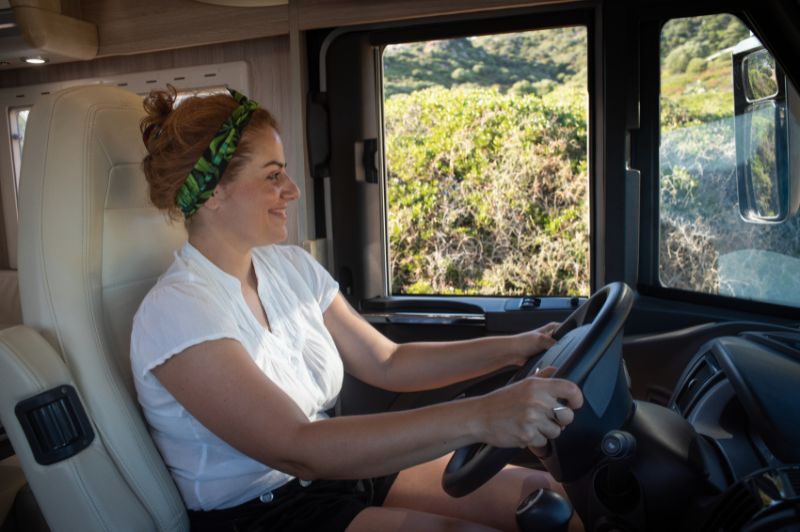
While there is no requirement for attending an RV Driving School, it would be tough to argue that it is not a good idea. If you have never driven an RV before it’s not like driving a car. Each type of RV has its own challenges and learning how to drive your RV properly can prevent you from getting into an accident, jack-knifing, damaging your RV or just getting embarrassed when backing into your camping site.
I remember the first time I drove a class A RV. It was huge and I was sitting so high off the ground! I was totally out of my element and felt uncomfortable. If anything out of the ordinary happened during that drive I would have been totally unprepared. And, hauling a 5th wheel, travel trailer or pop up camper all require special skills to maneuver them properly too.
I think small Class C RVs and Class B RVs are the easiest to drive but you still need to learn how to drive them correctly. For example, even though a small class c is easy to drive, it may not be easy to stop because of its weight. And knowing how to drive it in mountains, windy conditions, or rain will all a be new and different driving experience than you might be used to.
Getting the proper training you need to drive your new RV safely and courteously is the best thing to do. And RV Driving School is a great way to get started on the right foot. But, is RV Driving School Worth the Money or can you learn how to drive your RV on your own for less money? Read on to find out what would be best for you.
Do I Need RV Driving School to Obtain an RV License?
Unless you’re doing something unusual, you do not need a special RV license. Most states do not require a special license for RVs weighing under 26,000 pounds or towed vehicles under 10,000 pounds, and most RVs fall under these limits.
However, if you purchased an RV that exceeds these limits attending an RV Driving School would be a big help in obtaining the license or certification you need. Especially if you live in, or are traveling through, a state that falls into one of these categories.
How Much Do Class A, Class B, or Class C RVs Weigh?
Most RVs weigh well under 26,000 pounds. Class A RVs are where you may typically see a special license requirement. A Class A RV can weigh anywhere from 13,000 to 30,000 pounds. Therefore, for the biggest of Class A RVs, you may need an exclusive license. The average Class B RV weighs between 6,000 and 8,000 pounds, and a Class C vehicle typically weighs between 10,000 and 12,000 pounds.
Therefore, for most RVs and campers, you will not need a special license. The confusing thing for new RVers or those crossing state lines is that, when it comes to larger RVs, each state has its laws. While not the main topic of this article, the license requirements for theses states are provided below as a helpful resource.
States That Require a Commercial Driver’s License to Drive an RV
- Arkansas: CDL required for a vehicle over 26,000 lb
- Connecticut: CDL (Class B) required for a single vehicle over 26,000 lb; CDL (Class A) required for multiple vehicles with combined weight over 26,000 lb
- Hawaii: CDL (Class B) required for a single vehicle over 26,000 lb; CDL (Class A) required for multiple vehicles with combined weight over 26,000 lb
- Kansas: CDL (Class B) required for a single vehicle over 26,000 lb; CDL (Class A) required for multiple vehicles with combined weight over 26,000 lb
- New Mexico: CDL (Class B) required for a single vehicle over 26,000 lb; CDL (Class A) required for multiple vehicles with combined weight over 26,000 lb
- Washington, D.C.: CDL (Class B) required for a single vehicle over 26,000 lb; CDL (Class A) required for multiple vehicles with combined weight over 26,000 lb
- Wisconsin: CDL required over 45 feet
States That Require a Non-Commercial Special Driver’s License to Drive an RV
- California: Class B license required over 26,000 lb or over 40 feet; Class A license required for towing over 10,000 lbs
- Maryland: Class B license required over 26,000 lb
- Michigan: Recreational Double “R” Endorsement needed to pull a fifth wheel plus a trailer (it’s unlikely that you’ll ever need this)
- North Carolina: Class B license required for a single vehicle over 26,000 lb; Class A license required for multiple vehicles with combined weight over 26,000 lb
- Nevada: A Class B license is required for a single vehicle over 26,000 lb. A Class A license is required for multiple vehicles with combined weight over 26,000 lb. And a “J” Endorsement is needed to tow a vehicle over 10,000 lb if the combined weight is less than 26,000 lb.
- New York: Recreational Vehicle or “R” endorsement required for vehicles over 26,000 lb
- Pennsylvania: Class B license required for a single vehicle over 26,000 lb; required for multiple vehicles with combined weight over 26,000 lb
- South Carolina: Class E license needed for a single vehicle over 26,000 lb; Class F license required for multiple vehicles with combined weight over 26,000 lb
- Texas: Class B license required for a single vehicle over 26,000 lb; Class A license required for multiple vehicles with combined weight over 26,000 lb
- Wyoming: Class B license required for a vehicle over 26,000 lb and towing under 10,000 lb; Class A license required for a vehicle over 26,000 lb and towing over 10,000 lb
States That Do Not Require a Special Driver’s License to Drive an RV
- Alabama
- Alaska
- Arizona
- Colorado
- Delaware
- Florida
- Georgia
- Idaho
- Illinois
- Indiana
- Iowa
- Kentucky
- Louisiana
- Maine
- Massachusetts
- Minnesota
- Mississippi
- Missouri
- Montana
- Nebraska
- New Hampshire
- New Jersey
- North Dakota
- Ohio
- Oklahoma
- Oregon
- Rhode Island
- South Dakota
- Tennessee
- Utah
- Vermont
- Virginia
- Washington
- West Virginia
Laws can change over time, so be sure to check your local laws for up-to-date information.
Now that we’ve gotten through all that, let’s take a look at what kinds of RV Driving Schools are available and what to expect in choosing one.
Are RV Driving Schools in Person or on Video?
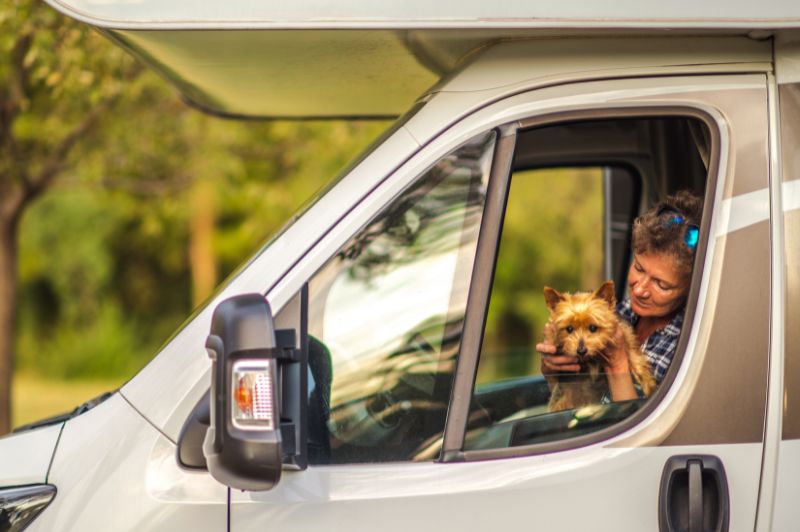
There are many schools available at reasonable rates for new RV owners to get hands-on training in operating their new RV. Many schools travel to your location and coach you right in your own RV. They even take you to a local campground where they help instruct you in safely pulling your rig into a campsite.
Often, RV Driving Schools will offer training at major RV shows and events. Some will even travel out-of-state to provide training. However, this would typically incur a higher cost.
If you don’t have the time or resources to travel to a hands-on RV Driving class, there are other options available. RV Driver Training DVDs and downloads from sources such as RV Education 101 can offer a workable alternative. Mark and Dawn Polk have been educating RVers for over 20 years through their website, RV Education 101.
I have personally watched many of their videos on how to drive an RV and many other things about RVing as well. In fact, we like them so much we include their courses on our RV Courses Page on our website. Their instructional videos about driving an RV, 5th wheel or Travel Trailer are excellent and you can learn and practice right at home.
I think their Video Bundles are the best value. They have bundles for Motorhomes, 5th Wheels and Travel Trailers. For example, the Motorhome Bundle includes 4 Online Videos and a Bonus RV Checklist e-book. The Videos included are: Motorhome Orientation, Drive Like a Pro, RV Essential Items, and Winterizing & Storing. These videos are reasonably priced, full of useful information and advice and I highly recommend them. For more information, you can visit their website rveducation101.com.
Where Can I Attend an RV Driving School Near Me?
RV Driving Schools are found at many locations in many states. Schools will have their permanent sites as well as seasonal sites and temporary spots. As mentioned above, RV Driving Schools will often provide classes at RV Shows and events. You can even find RV Driving School classes offered at larger RV Dealers.
Below are a few links to some well-known and recommended RV Driving Schools:
http://www.superiordrivers.com/rv-and-campers.html
How to Find an RV Driving School Near Me
RV School, home of the official “RV Driving School”, has professional instructors located in many places around the United States.
Check out the instructor locations for RV Driving School here.
In-person RV driving school is a great opportunity to get a hands-on training on driving your RV.
Although you can find plenty of RV driving lessons online, attending an RV driving school near you is always a great idea.
If you can’t find an RV driving school in your immediate location, you could always travel to one instead.
How Much Does RV Driving School Cost?
While attending an RV Driving School does have a cost, it is typically much cheaper than paying an RV insurance deductible. Prices and packages can vary, often with choices like a One-Day or aTwo-Day RV Driving Class, or a One-Day Refresher Course.
A Two-Day RV Driving Class (Private Lesson) might consist of 4 hours each day of individual behind-the-wheel training, covering a broad base of RV driving skills. Often a partner is encouraged to ride along. You might expect to pay about $500 for a package such as this.
A Two-Day RV Driving Class (2 Person – Private Lesson) would cover the same material over 6 hours each day. You might expect to pay about $700 for a package like this.
A One-Day RV Refresher Course might consist of 3.5 hours of individualized behind-the-wheel training. This type of driving course is geared toward people who have taken an RV Driving Course but may be having difficulty with some aspect of driving their RV. You might expect to pay about $250 for a class like this.
Again, remember that training and prices can vary, and these should be viewed only as typical examples.
What Will I Learn at RV Driving School?
Behind-the-Wheel lessons can cover a wide range of topics. Topics may vary slightly from school to school, but most should cover the areas listed below.
- Performing a Pre-Trip Safety Inspection of Your RV
- How to Use Your Mirrors
- Braking – Safe Use of Jake, Exhaust and/or Air Brakes
- How to Back Up Straight
- Backing Into an RV Site
- Cornering and Turning Radius
- “Swing outs”
- Driving Skills
- Defensive Driving
- Lane Management Including Staying in Your Lane and Proper Lane Changing
- City Driving
- Interstate Driving
- On and Off-Ramps
- Safe Driving Operations on Mountains and Hills
- Gas Stations
- Negotiating Tight Spots
- GPS Navigation
- Campground Maneuvering
- Proper Courtesy on the Road
- And so much more!
Benefits of Attending an RV Driving School
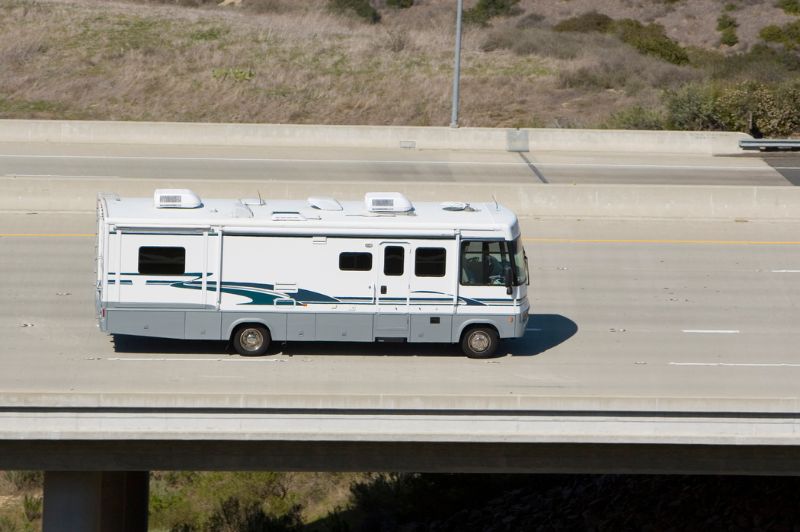
Enrolling in an RV driving course will provide you with the skills and knowledge necessary to keep you, your family, and other travelers safe on the open road. Some RV insurance providers will offer discounts on premiums to their policyholders who have attended an RV Driving School. Check with your agent to see if you qualify.
Since some states do require a special license to drive or tow RVs over specific weights or lengths, taking an RV driving course would be very helpful in obtaining the proper RV Driver’s License. You do not want to end up paying steep fines for not having the appropriate license or certification for driving or towing these larger RVs.
In addition to discounts on insurance premiums, RV driving courses can provide you with the skills, techniques, and knowledge to drive safely. And, an occasional refresher course can help keep old skills polished and add additional skills to your repertoire. It can also correct any bad habits you may inadvertently begin to pick up over time.
It is easy to check the internet for RV Driving Schools. Or, you can ask someone at your local RV store to find out if there’s a recommended RV driving course near you. Class are available in several formats and are quite affordable.
Additional RV Educational Classes and Courses
In addition to RV driving school, there are other types of courses you can take to help you learn all about the RV Life!
- RVer’s Online University by Escapees RV Club: Two courses that teach you how to become a full-time RVer and how to operate and maintain your RV safely.
- RV Life Masterclass Courses: multiple courses that teach you about boondocking, buying an RV, roadschooling, and so much more.
- RV Education 101: Dozens of courses on everything from winterizing your RV to RV driving, towing, and so much more.
- RV Tech Course: a home study course for RV maintenance and repair.
- National RV Training Academy: offers several RV courses for RV owners, those looking to become RV technicians, and those looking to become certified RV inspectors.
Conclusion
In the final analysis, a little RV driver education can go a very long way toward ensuring a safe and successful journey in your new RV. We think RV Driving School is totally worth the money because it is the best way to keep you, your family and other drivers safe.
Safe travels!
For more info on how to safely drive your RV check out some of out other Helpful Articles below:
- RV Weight Explained – Travel Trailers, Motorhomes, and 5th Wheels
- Maximum RV Width by State
- When is it Too Windy to Drive an RV?
- Travel Trailer Turning Radius Tips
- How Much Does RV Insurance Cost?
- 21 Must-Have RV Accessories for a New Camper or Travel Trailer
- Do I Need Wheel Chocks for an RV or Travel Trailer?
- Average Pop Up Camper Weight – All You Need to Know
Do you have an RV Driving Course you would recommend or any experience watching videos to learn to drive an RV, Fifth Wheel or Travel Trailer? Please leave your comments below!


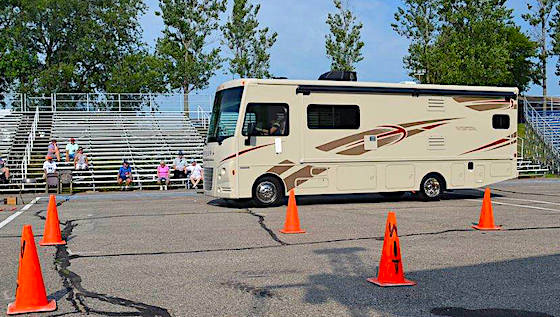
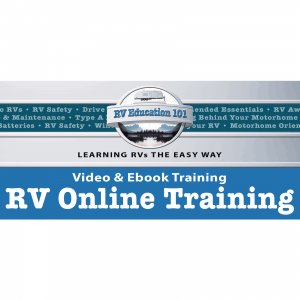
Definitely expensive and training was inadequate for what I wished to be taught. I addressed the main office and never heard back from them.